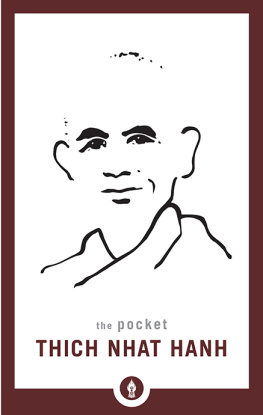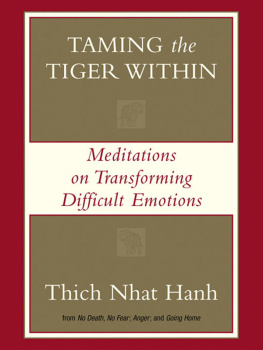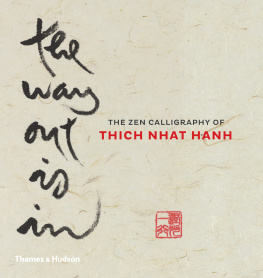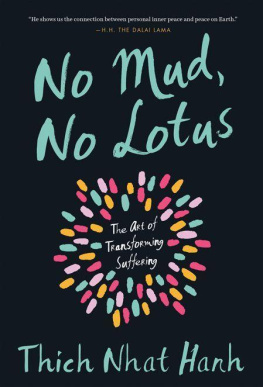All rights reserved. This book, or parts thereof, may not be reproduced in any form without permission.
Making or distributing electronic copies of this book constitutes copyright infringement and could subject the infringer to criminal and civil liability.
The Practice of Happiness
To be happy, to me, is to suffer less. If we were not capable of transforming the pain within ourselves, happiness would not be possible.
Many people look for happiness outside themselves, but true happiness must come from inside of us. Our culture tells us that happiness comes from having a lot of money, a lot of power, and a high position in society. But if you observe carefully, you will see that many rich and famous people are not happy. Many of them commit suicide.
The Buddha and the monks and nuns of his time did not own anything except their three robes and one bowl. But they were very happy, because they had something extremely preciousfreedom.
According to the Buddhas teachings, the most basic condition for happiness is freedom. Here we do not mean political freedom, but freedom from the mental formations of anger, despair, jealousy, and delusion. These mental formations are described by the Buddha as poisons. As long as these poisons are still in our heart, happiness cannot be possible.
In order to be free from anger, we have to practice, whether we are Christian, Muslim, Buddhist, Hindu, or Jewish. We cannot ask the Buddha, Jesus, God, or Mohammed to take anger out of our hearts for us. There are concrete instructions on how to transform the craving, anger, and confusion within us. If we follow these instructions and learn to take good care of our suffering, we can help others do the same.
Making a Change for the Better
Suppose there is a family in which the father and son are angry with each other. They are not capable of communicating anymore. The father suffers a lot and also the son. They dont want to remain stuck in their anger, but they dont know how to overcome it.
A good teaching is the kind of teaching that you can apply directly to your life, so that you can transform your suffering. When you are angry, you suffer as though you are being burned by the fires of hell. When you feel great despair or jealousy, you are in hell. You have to go to a friend who practices, and ask how to practice in order to transform the anger, the despair in you.
Compassionate Listening
Relieves Suffering
When a persons speech is full of anger, it is because he or she suffers deeply. Because he has so much suffering, he becomes full of bitterness. He is always ready to complain and blame others for his problems. This is why you find it very unpleasant to listen to him and try to avoid him.
To understand and transform anger, we must learn the practice of compassionate listening and using loving speech. There is a Bodhisattvaa Great Being or an Awakened personwho is capable of listening very deeply with a lot of compassion. She is called Kwan Yin or Avalokiteshvara, the Bodhisattva of Great Compassion. We all must learn the practice of deep listening like this Bodhisattva. Then we can offer very concrete guidance to those who come seeking for help in order to restore communication.
Listening with compassion can help the other person to suffer less. Yet, even if you have the best intentions, you cannot listen deeply unless you train yourself in the art of compassionate listening. If you can sit down quietly and listen compassionately to that person for one hour, you can relieve a lot of his suffering. Listen with only one purpose: to allow the other person to express himself and find relief from his suffering. Keep compassion alive during the whole time of listening.
You have to be very concentrated while you listen. You have to focus on the practice of listening with all your attention, your whole being: your eyes, ears, body, and your mind. If you just pretend to listen, and do not listen with one hundred percent of yourself, the other person will know it and will not find relief from his suffering. If you know how to practice mindful breathing and can stay focused on the desire to help him find relief, then you will be able to sustain your compassion while listening.
Compassionate listening is a very deep practice. You listen not to judge or to blame. You listen just because you want the other person to suffer less. The other person might be our father, our son, our daughter, or our partner. Learning to listen to the other person can really help her to transform her anger and suffering.
A Bomb Ready to Explode
I know a Catholic woman who lives in North America. She suffered very much because she and her husband had a very difficult relationship. They were a well-educated family; they both had doctorate degrees. Yet the husband suffered so much. He was at war with his wife and all of his children. He could not talk to his wife or to his children. Everyone in the family tried to avoid him, because he was like a bomb ready to explode. His anger was enormous. He believed that his wife and his children despised him, because no one wanted to come near him. In fact, his wife did not despise him. His children did not despise him. They were afraid of him. To be close to him was dangerous because he could explode at any time.
One day the wife wanted to kill herself because she could not bear it any longer. She felt she was not able to continue living under these circumstances. But before she committed suicide, she called her friend who was a Buddhist practitioner to let her know what she was planning to do. The Buddhist friend had invited her several times to practice meditation in order to suffer less, but she had always refused. She explained that, as a Catholic, she could not practice or follow Buddhist teachings.
That afternoon, when the Buddhist woman learned that her friend was going to kill herself, she said over the telephone, You claim to be my friend, and now you are about to die. The only thing I ask of you is to listen to the talk of my teacher, but you refuse. If you are really my friend, then please, take a taxi and come listen to the tape, and after that you can die.
When the Catholic woman arrived, her friend let her sit alone in the living room and listen to a dharma talk on restoring communication. During the hour or hour and a half that she listened to the dharma talk, she went through a very deep transformation within herself. She found out many things. She realized that she was partly responsible for her own suffering, and that she had also made her husband suffer a lot. She realized that she had not been able to help him at all. In fact, she had made his suffering heavier and heavier each day because she avoided him. She learned from the dharma talk that in order to help the other person, she should be able to listen deeply with compassion. That was something she had not been able to do in the last five years.



